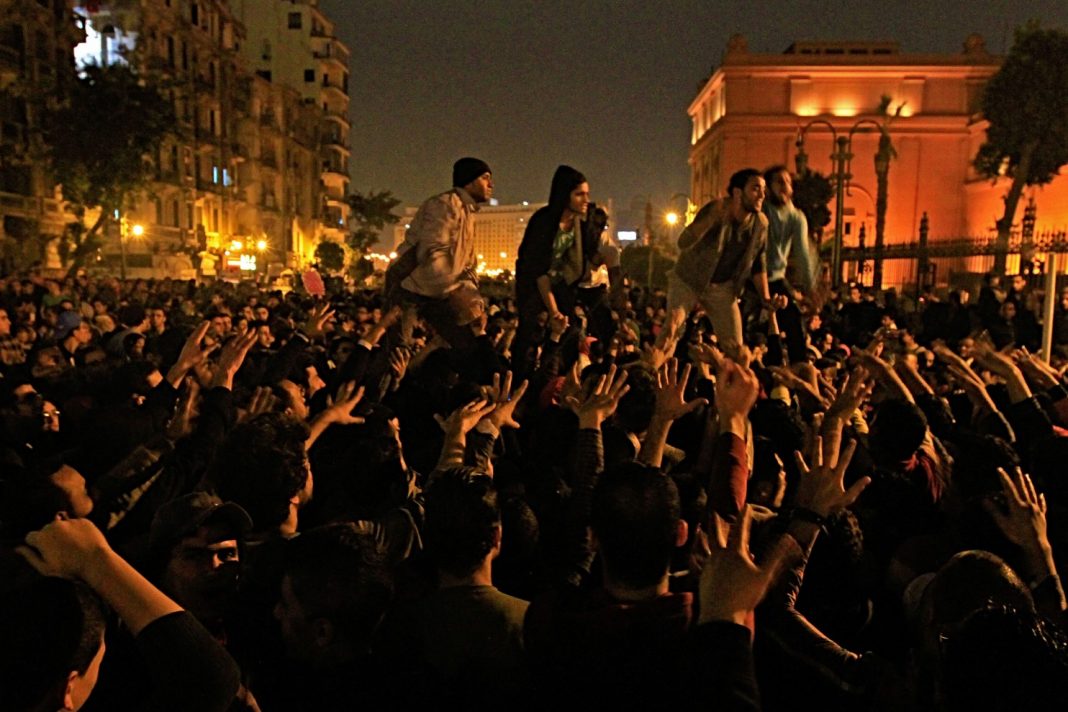The Egyptian revolution isn’t dead because it never happened in the first place
By Eric Trager/December 4 /14/The Washington Post
When an Egyptian court dismissed all criminal charges against former dictator Hosni Mubarak last weekend, many called it the final nail in coffin of the “revolution” that ousted Mubarak from power in February 2011. “Egypt’s revolution is dead,” CNN reported. “The January revolution is over; they ended it,” the father of an activist who was killed during the uprising told the New York Times. After the July 2013 ouster of Egypt’s first freely elected president and the subsequent rise of another former military general to the presidency, the end of Mubarak’s criminal case looks like the icing on Egypt’s counterrevolutionary cake.
Yet this narrative misunderstands what Egypt’s Tahrir Square revolt meant to many Egyptians, particularly those from the country’s political center, which is overwhelmingly rural and traditional, although not necessarily Islamist. Far from desiring the far-reaching – revolutionary – political reform that the “Arab Spring” narrative embodied, many of these Egyptians endorsed only the uprising’s two most basic goals: ending Mubarak’s 30-year rule and preventing the succession of his son Gamal. From their perspective, Mubarak had simply ruled for too long, and his apparent attempt to install Gamal as his successor reeked of pharaonism. For these Egyptians, the “revolution,” as they refer to the uprising, didn’t die with Saturday’s trial verdict, because Mubarak still isn’t president. And ever since Mubarak was overthrown, their goal has been to return to normalcy, even if that falls short of democracy.
It is difficult to establish just how widely this view is held: Polling in Egypt is notoriously weak; the Egyptian military used its control of the state media to discourage further revolutionary activity after Mubarak fell; and the current regime has quashed dissent substantially. But it is a sentiment that I have encountered repeatedly during the dozen or so research trips that I have taken to Egypt over the past four years, and it is useful for understanding the main reason the “revolution” didn’t die on Saturday: A true revolution never happened in the first place. This is what a crucial bloc of Egyptians wanted: stability, as they defined it, rather than the deep institutional reforms that a true revolution required.
In fact, during all of the major political developments of the past four years, many Egyptians have explained their actions and preferences to me in terms of “stability.” In this vein, they welcomed the military’s assumption of power after Mubarak fell, trusting the military as a stabilizing force. Many of them similarly supported the Muslim Brotherhood’s overwhelming victory in the 2011-2012 parliamentary elections and Mohamed Morsi’s narrow victory in the June 2012 presidential elections, viewing the Brotherhood as a well-organized political movement that could provide stability – a word the Brotherhood used frequently during its various campaigns. And when Morsi’s November 2012 power grab catalyzed massive discontent and months of political upheaval, a critical mass of Egyptians similarly welcomed the military takeover that ousted him in mid-2013 as a stabilizing force once again. These Egyptians now bristle when others (accurately) call Morsi’s ouster a “coup,” because for them, the primary goal was never procedural democracy.
Of course, the youth activists who catalyzed the Tahrir Square uprising had a very different view: They wanted a real revolution that completely overhauled the previous regime, and they hesitated to leave Tahrir Square even after Mubarak fell. The Mubarak regime, they argued, wasn’t just composed of one man and his family, but encompassed a whole set of repressive state institutions that remained firmly in place. So in the months that followed Mubarak’s ouster, the activists demonstrated repeatedly against the military junta that succeeded him, and staged multiple attacks on the Interior Ministry. But with each new round of mobilization, the activists found their numbers shrinking, as the Islamists focused on electoral campaigning while the centrists wanted all protest activity to cease immediately.
Yet in those early months after Mubarak’s ouster, the activists still had one rallying cry that could draw large numbers to Tahrir Square: “Put Mubarak and his cronies on trial!” Although many Egyptians saw little use in trying Mubarak, an 82-year-old ex-dictator with no prospect of returning to power, they didn’t object to it either. So starting in late March 2011, the activists organized demonstrations demanding Mubarak’s arrest. Fearing that it could become the target of the next uprising, the military complied and detained Mubarak on April 13. The fact that Mubarak’s indictment was political – and it undoubtedly was – contributed to the dropping of charges against him on Saturday.
Once Mubarak was on trial, however, the activists were rarely able to mobilize the masses on their own. Meanwhile, sensing the activists’ alienation from the broader Egyptian public, the military junta increasingly repressed the ongoing demonstrations with brutal force. Dozens were killed in the year after Mubarak’s ouster, and thousands more wounded – with minimal popular outcry beyond the activists’ ranks. When the current regime effectively banned massive demonstrations last year, its large “stability”-oriented base naturally hailed the move.
The current regime’s support within this segment of the population is likely to evaporate if President Abdel Fattah al-Sissi does not provide political and economic stability. But even then, support for far-reaching institutional change – a real revolution – probably would remain slim within Egypt. The violent chaos that has overtaken other “Arab Spring” revolutions, such as in Syria and Libya, is precisely the sort of future that many Egyptians prefer to avoid. But even before these civil wars exploded, many Egyptians already were wary of revolution, and content to settle for Mubarak’s ouster.




















